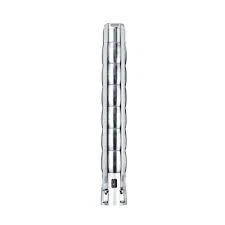Nov . 15, 2024 09:47 Back to list
submersible well pump review
Submersible Well Pump Review A Comprehensive Look
Submersible well pumps are essential devices used to draw water from deep underground aquifers. Their design and efficiency make them a popular choice for residential, agricultural, and commercial applications. In this review, we will explore the various features, benefits, and considerations to keep in mind when selecting a submersible well pump, ensuring you make an informed decision for your water needs.
What is a Submersible Well Pump?
A submersible well pump is a type of pump that operates while submerged in water. It consists of a sealed motor and a pump body, usually made from durable materials such as stainless steel or thermoplastic, designed to withstand water pressure and corrosion. These pumps are typically installed in wells and can efficiently lift water to the surface through a vertical column.
Key Features to Consider
1. Material The construction material of the pump is critical for durability and longevity. Stainless steel is often favored due to its strength and resistance to rust and corrosion, while thermoplastic is lighter and generally cheaper but may not last as long.
2. Motor Power The motor power, typically measured in horsepower (HP), is a significant factor when selecting a pump. Higher horsepower is needed for deeper wells or higher flow rates. Pumps range from 0.5 HP to 2 HP or more, so it’s essential to assess your water needs and well depth.
3. Flow Rate The flow rate, measured in gallons per minute (GPM), indicates how much water the pump can deliver. Different applications require different flow rates, so understanding your specific needs is crucial when choosing a pump.
4. Depth Rating Submersible pumps are rated for specific depths. It’s vital to select a pump that can operate efficiently at the depth of your well.
5. Impeller Design The design of the impellers, responsible for moving water, can impact the pump’s efficiency and ability to handle particular types of liquid. Mulit-stage pumps are preferred for deep wells, as they can generate higher pressure.
submersible well pump review

6. Energy Efficiency Choosing an energy-efficient pump can result in significant cost savings on electricity bills over time. Look for pumps with high-efficiency ratings and energy-saving technologies.
Advantages of Submersible Well Pumps
1. Efficiency Submersible pumps are designed to operate underwater, which facilitates smooth functioning and prevents overheating. Their ability to push water to the surface makes them more efficient than other types of pumps.
2. Space-saving Design Being installed underwater, submersible pumps save space and minimize noise, which can be particularly beneficial for residential settings.
3. Lower Maintenance Since they are submerged, submersible pumps tend to face fewer issues related to debris and air exposure, resulting in decreased maintenance needs.
4. Versatility These pumps can be used in various applications, including irrigation, drinking water supply, and dewatering, making them versatile tools for homeowners and businesses alike.
Considerations Before Purchase
Before purchasing a submersible well pump, it is essential to assess your specific needs thoroughly. Factors such as well depth, desired flow rate, and the intended application will guide your choice. Additionally, consider the pump's warranty and service availability as these can impact its long-term reliability and support.
Conclusion
In conclusion, submersible well pumps are a reliable and efficient solution for extracting water from wells. Their design, efficiency, and versatility make them a popular choice for various applications. By understanding the key features and considerations outlined in this review, consumers can make a more informed decision when selecting the best submersible well pump for their specific needs. Whether for residential use or commercial applications, investing in the right pump will ensure a consistent and dependable water supply for years to come.
-
Submersible Water Pump: The Efficient 'Power Pioneer' of the Underwater World
NewsJul.01,2025
-
Submersible Pond Pump: The Hidden Guardian of Water Landscape Ecology
NewsJul.01,2025
-
Stainless Well Pump: A Reliable and Durable Pumping Main Force
NewsJul.01,2025
-
Stainless Steel Submersible Pump: An Efficient and Versatile Tool for Underwater Operations
NewsJul.01,2025
-
Deep Well Submersible Pump: An Efficient 'Sucker' of Groundwater Sources
NewsJul.01,2025
-
Deep Water Well Pump: An Efficient 'Sucker' of Groundwater Sources
NewsJul.01,2025
-
 Submersible Water Pump: The Efficient 'Power Pioneer' of the Underwater WorldIn the field of hydraulic equipment, the Submersible Water Pump has become the core equipment for underwater operations and water resource transportation due to its unique design and excellent performance.Detail
Submersible Water Pump: The Efficient 'Power Pioneer' of the Underwater WorldIn the field of hydraulic equipment, the Submersible Water Pump has become the core equipment for underwater operations and water resource transportation due to its unique design and excellent performance.Detail -
 Submersible Pond Pump: The Hidden Guardian of Water Landscape EcologyIn courtyard landscapes, ecological ponds, and even small-scale water conservancy projects, there is a silent yet indispensable equipment - the Submersible Pond Pump.Detail
Submersible Pond Pump: The Hidden Guardian of Water Landscape EcologyIn courtyard landscapes, ecological ponds, and even small-scale water conservancy projects, there is a silent yet indispensable equipment - the Submersible Pond Pump.Detail -
 Stainless Well Pump: A Reliable and Durable Pumping Main ForceIn the field of water resource transportation, Stainless Well Pump has become the core equipment for various pumping scenarios with its excellent performance and reliable quality.Detail
Stainless Well Pump: A Reliable and Durable Pumping Main ForceIn the field of water resource transportation, Stainless Well Pump has become the core equipment for various pumping scenarios with its excellent performance and reliable quality.Detail
